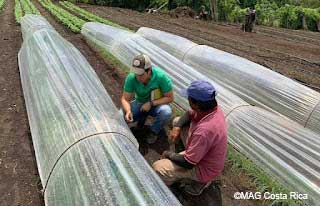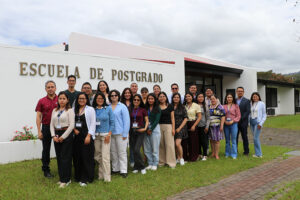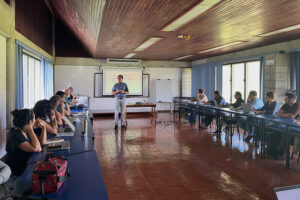Non-reimbursable funds will promote agricultural modernization in potato and onion crops

- MAG, SBD, and CATIE launch Subprogram for the Competitive Reactivation of the Horticultural Sector.
With the aim of transforming and modernizing potato and onion production in Costa Rica, the Ministry of Agriculture and Livestock (MAG), in coordination with the Development Banking System (SBD) and CATIE (Tropical Agricultural Research and Higher Education Center), officially launched on Wednesday, June 11, the Subprogram for the Competitive Reactivation of the Horticultural Sector.
This financial instrument, which is part of the INNOVA-D Program for Business Development Services, provides non-reimbursable funds for small and medium agricultural producers, in order to promote the adoption of precision agricultural technologies and good productive practices, improve the efficiency in the use of natural resources, and facilitate adaptation to climate change.

“Costa Rican agriculture is advancing in a process of innovation and modernization. With this program, we reaffirm once again that the future of national agriculture will be more modern, efficient, and sustainable, with the promise of generating greater opportunities for farming families and offering better quality food at more accessible prices for consumers,” stated the Minister of Agriculture and Livestock, Víctor Julio Carvajal Porras.
"At CATIE, we support this effort to modernize potato and onion cultivation, promoting more efficient and sustainable technologies,” said Dr. Luis Pocasangre, Director General of CATIE. “Through our bio-inputs center, we will provide technical assistance in the use of biological products and practices that help reduce chemical load and improve soil health.”
He also added that “through ACTIVA—a unit with extensive experience in managing non-reimbursable funds and efficient procurement processes—CATIE can facilitate the acquisition of the equipment and materials required by producers to implement technological innovations that increase production.”
This Subprogram will finance investments of up to ¢4,500,000 per hectare, allowing producers to incorporate technologies such as sensors, advanced irrigation systems, fertilization plans adjusted to the phenological development of crops, soil analysis, and soil coverage systems.
In addition, comprehensive technical assistance and training in good agricultural practices will be provided, within a strategy that prioritizes the economic and financial inclusion of producers, strengthening the competitiveness of the horticultural sector and access to new markets.
Vladimir Valera, Director of ACTIVA-CATIE, stated that for the institution, “it is an honor to take on the implementation of the INNOVA-D Subprogram, recognizing the trust that MAG and SBD have placed in our technical team. This commitment represents a great responsibility, and we take it on with the conviction of implementing a rigorous and efficient process that truly benefits the country’s horticultural producers.”
The strategy is part of a comprehensive vision by MAG to stimulate productive linkages, improve sector profitability, and ensure a transition to more resilient and sustainable agricultural systems, promoting the commercialization of fresh and healthy products with low chemical load for consumers.
Written by:
Oficina de prensa del MAG
CATIE Communication and Marketing Office
comunica@catie.ac.cr
Tag:cebolla, costa rica, papa



